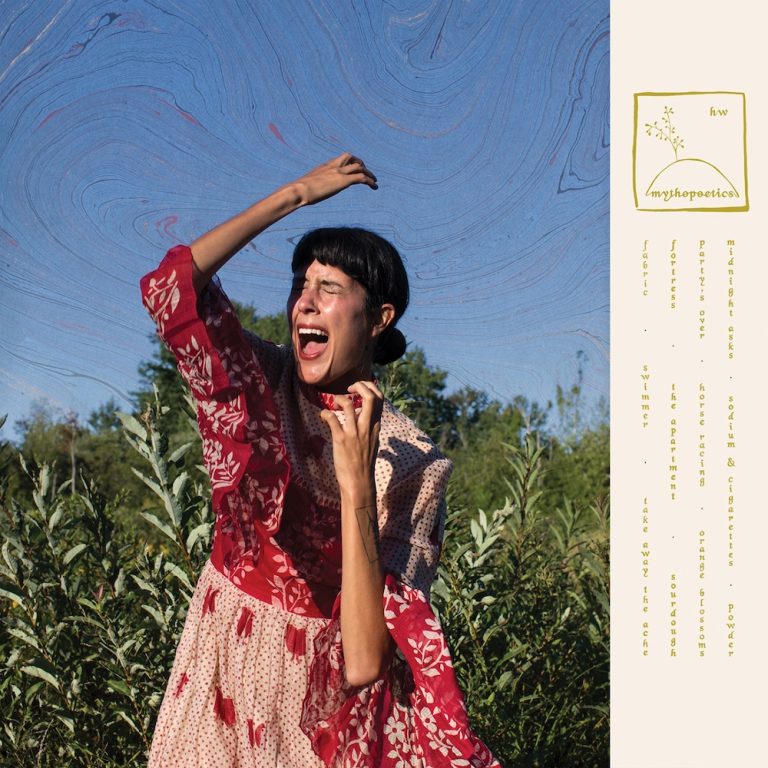Mythopoetics is a record of forward momentum. Decidedly so, even. Like roots beneath a tree, these songs burrow through all obstacles and landscapes in Nandi Rose’s way. Sweating, striding, coping, lying: whatever it takes to make it to the other side relatively unscathed. It might take a listen or two, but one of the remarkable things about Half Waif’s fifth album is how it never returns to the same place twice. Sure, words and melodies might be repeated; the music rippling beneath continues taking on new shapes and textures.
This album was recorded right after mastering previous LP The Caretaker – the latter required a more stationary process from Rose. She composed Mythopoetics with her drummer Zubin Hensler, a more reciprocal dynamic that feeds into the music’s restless energy. An early highlight is “Swimmer”, a stirring song inspired by Rose’s aunt, who suffers from Alzheimer’s. The music shapeshifts in spectacular (though easy-to-miss) fashion around the 54-second mark, its arpeggiated movements signifying a focused grit and fortitude that’s very much echoed by the equally spectacular music video. Here we see Rose playing a hero trying to ‘reach’ a woman of permeating light, frantically fighting her way through masked goons on a motorcycle chase.
Themes like resilience and perseverance are rife on Mythopoetics, with Rose reaching for her vivid imagination whenever personal experience falls short and vice versa. There’s a seething, knee-jerk intensity throughout: “Take Away The Ache” could easily be reduced as a simmery piano-based song, if not for the serpentine, insect-like rhythms blemishing it. “I know I’m asking for more than you can give / but isn’t love just more than living like that?”, Rose asks at one point, and it almost feels as if she’s addressing the listener here directly. This is a record about survival and coping mechanisms, and Half Waif appears very intent on expressing that internal struggle within the compositions themselves.
Many of the songs sound like they’re on the verge of collapsing in on themselves: the static, tectonic beat of “Fortress” is like watching a stained-glass window shatter in slow motion. Rose’s dramatic vocals are powerful and tenacious enough for listeners to stick around, albeit just long enough before the floor collapses beneath their feet again. For those rather unfamiliar with Half Waif’s work, listening to Mythopoetics definitely invokes outright concern: the music truly sounds like Rose is going through the scrap of a lifetime, shrugging off trial after trial like some Anime protagonist.
Half Waif’s music, however, manifests within an echo chamber where human feeling transmutes into grandiose, fairy tale imagery. The album’s intensity can be attributed to Rose leaning into that ingrained talent more viscerally than ever, which explains its emotional punch. Living in a rural home in upstate New York, she fervently immersed herself into different types of activities: literature, gardening, bird watching. By doing things that shifted the energies she’d normally preserve for touring, she was able to power through that sense of loneliness and isolation. Congruently, Mythopoetics always reaches for a higher ground sonically, and the ears sometimes have trouble keeping up with the sheer scramble of it all. It’s definitely not an album that lands after one or or two casual listens.
“Midnight Asks”, a glacial synth pop romp, contemplates the fragility of life by recollecting a nighttime drive Rose always makes between Albany and her home. The eyes of the deer are luminous on the side of the road and concurrently, the possibility of sudden death is always afoot. Instead of recoiling in fear, however, a sense of thrill and relish pervades inside the song. Half Walf concentrates her gaze on the road ahead and affirmingly sings, “I don’t want to die tonight.” That thousand-yard stare persists on “Horse Racing”, which isn’t concerned with any victory lap: about two-thirds into the song, it breaks free from its pop-idiom shackles (it’s by far the most accessible track on Mythopoetics) and unfurls more ethereal and structureless like an organic lifeform. “Can you see I’m holding on?” she bellows assuringly despite straying off course into the horizon. It’s another moment that feels very high-stakes and desperate: it’s no surprise “Horse Racing” is the only track on the album written during the pandemic.
As a whole, Mythopoetics feels like a deliberate transitional phase for Half Waif: songs like “Party’s Over” and “Sourdough” were largely inspired by how Rose projects her existence onto her direct environment, and are acutely self-aware in their own ambivalence. Devoid of meaty pop nuggets, Mythopoetics sounds like an unstable wormhole that travels from 2020’s critically-lauded The Caretaker to wherever the heck the Half Waif project lands next. One thing’s for certain: Nandi Rose is not on some fixed predestined route, but on a journey of her own choosing.

